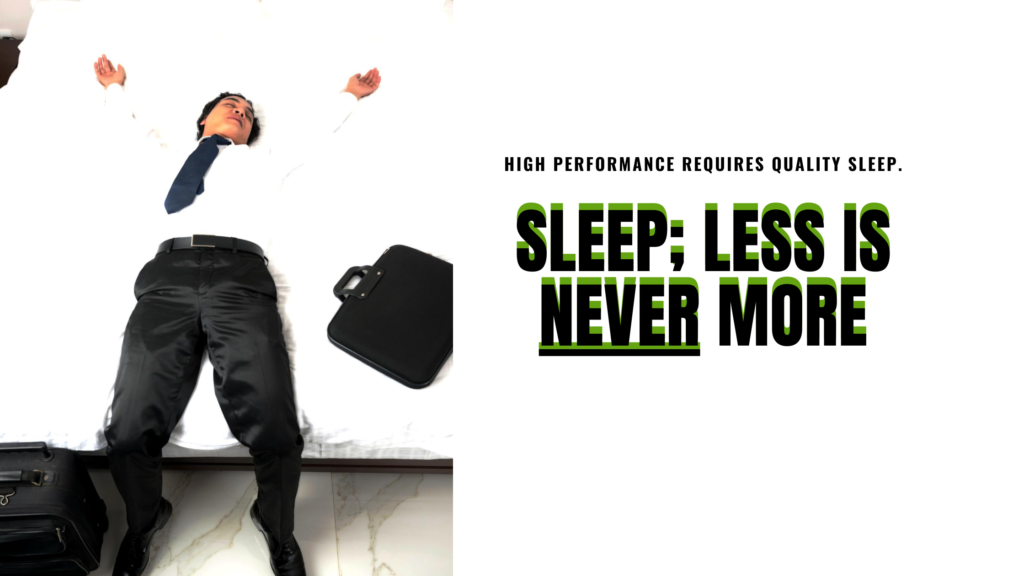
by Sylvie Manaigre
Years back, I had read an article that argued that if you slept 4-6 hours a night during the week, you could ‘make up’ lost sleep by sleeping 12 hours on the weekend… That supported my false belief that if I slept less, I could achieve more. So, that’s what I did. My rule was 4 hours minimum. If I was up working until 2:00AM, I would set my alarm for 6:00AM. I thought I was cheating the system, but I was in a perpetual fatigue cycle and didn’t even realize it. It had been so long since I had been fully rested, that tired had become my normal state of alertness. I thought sleep was a luxury that I couldn’t afford. I learned the hard way that the cost of not sleeping is much higher.
Frantic mornings were common. When the alarm would sound, I’d hit snooze. Alarm. Snooze. Alarm… I’d turn off the alarm. Accidentally fall back asleep. Wake up late. Panic. Get dressed in the dark. Gather random items in a bag, forget the essentials. Rush out the door. Drive off speeding. Hit a curb. Express road rage towards cars simply obeying the speed limit. Skip paying for parking, or straight up park illegally because I couldn’t afford being any later. Bomb a presentation because my mind is foggy. Get a parking ticket… All within the first of my 20 waking hours. I would start every day in an energy deficit, convinced that if I caffeinated enough, I could work my way out of it.
Friends worried that I was going to burn out. I noticed the toll that the lack of sleep was having on me. I was working longer hours with diminishing results. I was moody. I got an ulcer. I stopped eating regularly. I would often blackout from moving too quickly or standing. I kept making excuses: “I’ll slow down after this, or before that…” As an athlete, pushing my limits was easy. The real challenge was slowing down and taking a step back. I had been working at an insane pace for so long, I couldn’t imagine doing anything else… until the trade-offs added up, and I became completely, tragically unhappy.
Similar to the way I used to ignorantly brag about my high tolerance to alcohol, I boasted about my lack of need for sleep (as though it was some sort of impressive display of high performance). Interestingly, over consumption of alcohol and lack of sleep have similar negative effects on cognitive performance.
According to Dr. Charles A. Czeisler, the Baldino Professor of Sleep Medicine at Harvard Medical School. “We now know that 24 hours without sleep or a week of sleeping four or five hours a night induces an impairment equivalent to a blood alcohol level (BAC) of 0.1%.” In Ontario, Canada, it is illegal to drive with a BAC of 0.08% percent or above.
- 72.3% of Ontario drivers have taken to the roads while fatigued
- ~20% of all fatal and injury crashes are fatigue-related.
Have you ever gone straight into work off a red eye flight? Or driven for hours on hardly any sleep only stopping after you started dozing off? I have. Too many times without considering the potential deadly consequences of my irresponsible actions. Even though I was sober, I was as good as wasted!
If we reference this wikipedia chart, 0.1% BAC means we’re a total mess sans blackout. Basically when we pull an all nighter, we’ll feel terrible, act like drunks, and remember all of it.

Sleep isn’t just essential for our physical wellbeing. Sleep breeds creativity and productivity, and happiness. According to Daniel Kahneman (author of the mega bestseller Thinking: Fast and Slow) the quality of one’s sleep is directly associated with more life satisfaction.
So how much sleep do we really need? The CDC, recommends the following:
|
Age Group |
Recommended Hours of Sleep Per Day |
|
|
Newborn |
0–3 months |
14–17 hours (National Sleep Foundation) No recommendation (American Academy of Sleep Medicine) |
|
Infant |
4–12 months |
12–16 hours per 24 hours (including naps) |
|
Toddler |
1–2 years |
11–14 hours per 24 hours (including naps) |
|
Preschool |
3–5 years |
10–13 hours per 24 hours (including naps) |
|
School Age |
6–12 years |
9–12 hours per 24 hours |
|
Teen |
13–18 years |
8–10 hours per 24 hours |
|
Adult |
18–60 years |
7 or more hours per night |
|
61–64 years |
7–9 hours |
|
|
65 years and older |
7–8 hours |
|
The quality of sleep we get is just as important as the quantity. Poor sleep has been linked to obesity, psychiatric disorders, heart disease and stroke. Missing 1 or 2 hours of sleep may not seem like a big deal, but it can negatively affect our mood, energy levels, and ability to handle complex tasks. This isn’t revolutionary information. We all know we should sleep 7-8 hours a day, yet according to the government of Canada;
- 1 in 3 Canadians aren’t getting enough sleep.
- Almost half of all Canadians do not find their sleep refreshing.
Those stats aren’t surprising since we just aren’t trained to sleep for that long. Just like any other habit, we need to practice and condition ourselves to sleep more. Here are some tips that helped me create long-term success and happiness, through better sleep habits:
- Sleep at least 7-8 hours daily. Even if you don’t want to, lay in bed for that amount of time.
- Create an environment that promotes sleep (eliminate distractions, regulate temperature ~60-70F, blackout blinds, etc)
- Avoid Blue light at least 1 hour before bed
- Experiment with different sleep cycles.
- Track how many hours you sleep (with an app or a journal) and how more/less sleep makes you feel.
- Workout! Being physically active during the day can help you fall asleep more easily at night just avoid vigorous physical activity just before going to bed
- Avoid large meals, caffeine, and alcohol before bedtime
Let’s do everything we can to ensure we sleep better. Our health, performance, and other’s safety depend on it. Next time you feel like sacrificing 1 or 2 hours of sleep to finish that presentation, or to get through a new Netflix episode, remember the trade offs that you are making. If you can’t do it for yourself, sleep for the people who need you on your A-game. Nobody deserves to deal with Sleep-Deprived Sylvie.
When it comes to sleep, less is never more.


Pingback: The Worst Excuse of All Time – MB Health & Performance